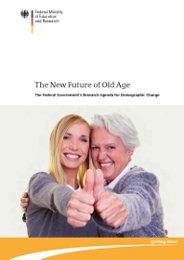Principal Issues in a Society of longer Lives
Any research aimed at finding concepts, models and solutions for a society of longer lives needs to orientate itself towards the question of which kind of society we wish to live in in the future. Research in the humanities
and social sciences plays a key role in the public discourse about this question.
Expanding the knowledge base
Sound knowledge about imminent demographic developments provides the basis for the successful management of a society of longer lives. The Federal Government will there-fore continue to support the exploration of causes and consequences of demographic change in the future. The focus lays on the advancement of suitable methods, the sophistication of the required statistical systems, interdisciplinary exchange, international networks, and putting the knowledge and technologies into practice.
We pay particular attention to the living conditions of older people, including the rapidly growing group of the oldest old. Of equal importance are gender-specific analyses in order to detect and compensate for existing and emerging inequalities in the life situations of male and female seniors. Based on these findings, we will adapt and expand existing measures targeted at the management of demographic change.
Establishing a realistic image of old age
Many people are afraid of old age and a society in which an increasing number of elderly is accompanied by a decreasing number of young people. Viewed in this manner the problems all too easily come to the foreground, obscuring the opportunities. The Federal Government therefore supports research into the socio-cultural construction of images about old age, and the creation and dissemination of realistic images of old age. With this, we intend to stimulate a process of rethinking that brings about a more differentiated image of old age and a society of longer lives – moving away from clichés and stereotypes.
Of equal importance in this respect are the consequences of changes in the legal framework conditions, for example by formulating a law against age discrimination. It is necessary to break down prejudices, approach the subject of old age without bias, and acknowledge that the fabric of a society of longer lives will be different from that of today’s society. However, this will open up new perspectives and opportunities in social, cultural and individual terms.
Recognizing and defusing intergenerational conflicts
A society of longer lives also needs to address issues associated with the distribution of burdens and resources. We therefore fund the precautionary investigation of intergenerational self-concepts and the social roles that they claim for themselves and actually fulfil. With this, we foster sustainable approaches to ensure inter-generational equity and solidarity. In addition to the elementary question of material security we are concerned about the establishment of a culture of mutual and inter-generational esteem. Such a culture will uncover the potentials of each generation while increasing the visibility of the contributions of older people to their families and society, which is all too often taken for granted.
Considering the acceptance of technological solutions
In the development and usage of technological solutions, ethical, legal and social aspects must be considered and taken into account right from the start – in particular where technologies carry out innovative assistance functions for humans. The Federal Government will therefore support research into the acceptance vis-à-vis new technological applications for a society of longer lives.


